Priestley Centre charts progress at first anniversary event
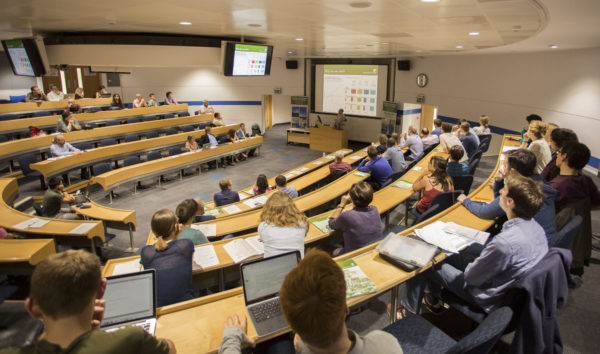
One year on from its formal launch the Priestley International Centre for Climate has 187 members with representation across eight faculties, three new Chairs, 22 University Academic Fellows and an interdisciplinary doctoral programme, as well as seeing an increase in the number of academics involved in climate related research across the University of Leeds.
The information is included in a new report published for the Centre’s annual event and Piers Sellers Prizes on 15 June 2017. The publication highlights multidisciplinary research taking place across the Priestley Centre’s four global solution spaces and includes an annual report in infographic form. The figures reveal that over 171 academics are working on climate change with 197 active climate research awards raising £65 million in grant income.
Director Piers Forster opened the event with a round up of the year’s progress, including plans for the Centre to have its own building. Jason Lowe, the first new Chair to take up his appointment, was then invited to give a presentation on solution centred climate science, which underpins the Priestley Centre’s research programme.
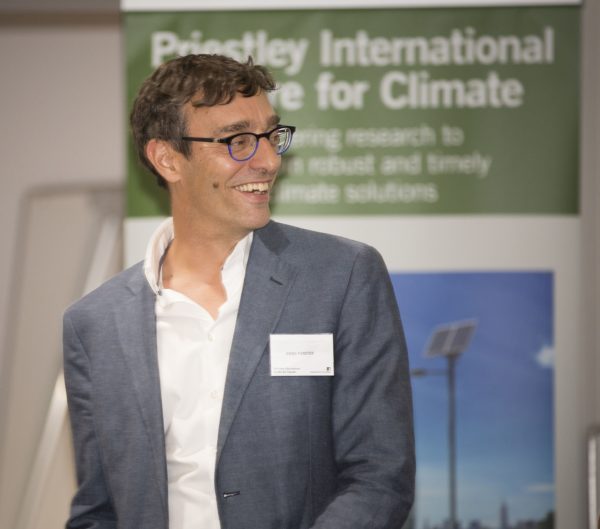
Professor Piers Forster, Director of the Priestley International Centre for Climate
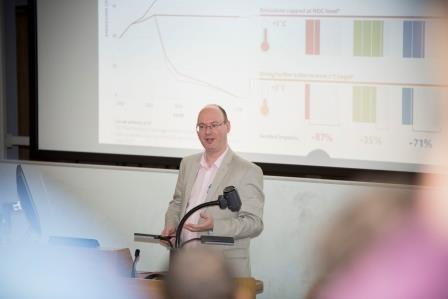
Professor Jason Lowe, new Priestley Chair
The event also took time to reflect on the life and work of astronaut and climate scientist Piers Sellers, who gave his name to the Priestley Centre’s annual climate awards, which are jointly sponsored by the University of Leeds alumni Footsteps Fund and the Priestley International Centre for Climate. Piers Sellers, who did his PhD at Leeds, died in December 2016 from pancreatic cancer. An edited film of the video address he sent from NASA for the 2016 launch was shown and Wolfgang Buermann, who worked with Piers Sellers in earlier days on Biosphere 2, gave a personal tribute.
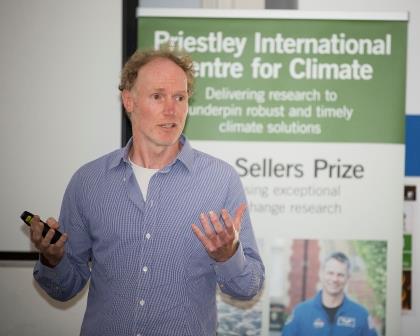
Dr Wolfgang Buermann pays tribute to Piers Sellers
University of Leeds student Kate Scott, winner of the 2016 Piers Sellers Prize for exceptional PhD research, also spoke of her written contact with Piers Sellers after receiving her award and the encouragement he gave her, as well as the professional boost the prize afforded her.
The 2017 recipient of the PhD prize was Ross Gillard, cited for having already published four papers, two as solo author, on the politics of climate and energy during austerity in the UK 2006-2016. Ross was unable to attend the prize giving, but sent a message of thanks, saying “It means a lot to have my thesis work formally acknowledged and it gives me an excellent opportunity to attend an international conference.” Professor Andy Gouldson, one of Ross’s supervisors, accepted the award on his behalf.
The winner of the Piers Sellers Prize for a world leading contribution to solution focused climate research was Felix Creutiz of the Mercator Research Institute on Global Commons and Climate Change in Berlin. Nominated by Dr Julia Steinberger for his transdisciplinary work on bioenergy and land use, urban infrastructures and transportation and his “extraordinary ability to traverse these three niches”, Prof Creutzig was a lead author of the IPPC Fifth Assessment Report and has published extensively.
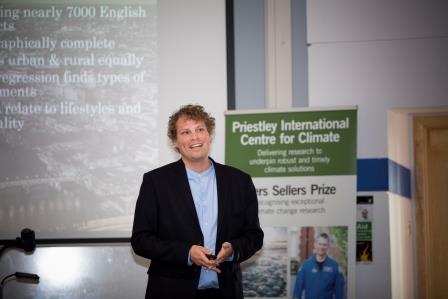
Prof Felix Creutzig, winner of the international Piers Sellers prize
Following the presentation by Dr Steinberger, Prof Creutiz gave a 30-minute talk entitled “Urbanisation and Climate Change”, addressing key questions around the role of urban mitigation contributions at the global scale, the role of cities in the process and how to address the issue at the human scale through demand-side mitigation.
The event also gave a chance to review the range of high-level publications that Leeds’ climate researchers have contributed to over the past year, in the context of the Centre’s four global solution spaces (Improving predictions of future climate; Understanding risk to develop a resilient world; Enabling low carbon transitions, and Social, Political and Economic Dimensions of Climate Change). Dr Maria Berger from the School of Biology, one of the authors of a key Nature paper on the bleaching of coral reefs, then gave a short presentation on coral reefs as sentinels of climate change.
Finally, the launch of the new Priestley Society was announced by Rachel Harcourt, one of the Priestley Centre’s first cohort of interdisciplinary PhD students. The Priestley Society, which is open to anyone at the University of Leeds working on climate related research, will be self organising and aims to facilitate new collaborations between researchers across all fields of study through social events and training/development opportunities.
Photographs: Anthony Glossop

